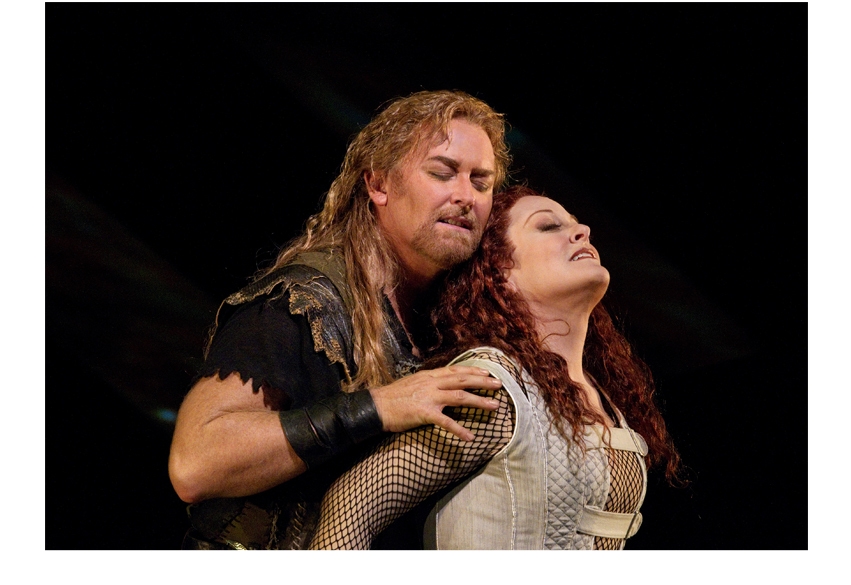I only very recently began going to live Met relays in the cinema, but if you can get in it’s very well worthwhile. In Cambridge, where the sound is so-so, as I discovered going to Siegfried, there is no hope of getting in except on the day booking starts. In Huntingdon, where the sound is fantastic, there was just a handful of oldsters for Die Walküre in May, who were rewarded with the best Act I that I have ever seen, thanks to the electrifying conducting of James Levine and the amazing Siegmund of Jonas Kaufmann; and the rest of the performance was of a high standard.
Siegfried skirted the sensational, thanks to the last-minute replacement in the title role, Jay Hunter Morris. Remember that name. I Googled him and he has been around for some time, singing mainly in the United States, but his appearance in this most taxing of all operatic roles will clearly mark his breakthrough. I remarked to my companion that he looked more like a Tristan than a Siegfried, and was thrilled to discover that he is to sing Tristan with Welsh National Opera early next year. Of all the singers in Siegfried he was the one who emerged from the relentless close-ups with most credit. He is an excellent actor, he is handsome with a good figure, he sings strongly — so far as one can judge from loudspeakers — he is sensitive to words and, perhaps most remarkably of all, he stayed the course as very few Siegfrieds do, seeming to have voice to spare. It is decades since I have heard the role performed as well as this.
Fortunately, he had the full support of the Met’s magnificent orchestra under Fabio Luisi, an absurdly underrated conductor, who explained in an interval interview that he wanted a light-textured Siegfried, though he also did justice to the movement throughout the work from the orchestral growlings of the first two acts to the radiant single high line of violins as Siegfried arrives at the mountain top. The rest of the cast was adequate without, with the exception of Alberich, being outstanding. Eric Owens in that role was a wonderful antagonist for anyone he encountered in Act II, and it’s a pity that Bryn Terfel, the Wanderer, was sonorous but not yet a great deal more in this rewarding and subtle part. His most moving moment was his last, just before he left the stage to ‘the eternally young’. The Mime, Gerhard Siegel, was neither miserable nor malevolent, the character’s two most pronounced characteristics, but he sang well. Deborah Voigt was preferable in this opera to the Brünnhilde she had tried to be in Die Walküre, but she is fundamentally miscast.
I have been trying to get clear with myself what would have been the advantage of being in the audience at the Met rather than watching it in a comfortable cinema, and have tentatively concluded that there wouldn’t have been one. What I take exception to, from the two operas I have seen on the screen, is the unwillingness of the cameras to desist from close-ups, which tend to make one concentrate unduly on how much singers sweat, and which also tend to be focused on who is singing rather than who is being sung to.
In Siegfried, too, we almost never got the long view. Mime’s cave appeared to be a mill, indeed there were waterfalls everywhere. The flames through which Siegfried swam rather than walked were superb, but otherwise I think Robert Lepage is too much in love with the enormously elaborate and accident-prone scenery he has had constructed. The other vexing feature of these relays is the interval features with one or another operatic star gushing in all directions and having mainly idiotic chats with the singers and others. The intervals should be silent. Otherwise I look forward to regular visits, few of which can possibly be as rewarding as these first two were.
The Royal Opera has revived Bellini’s exquisite La Sonnambula after nearly a decade in Marco Arturo Marelli’s senseless production, which relocates Bellini’s simple tale of country folk eager to believe the worst of anyone to a 20th-century sanatorium. A grand, elaborate set which can be ignored, while one concentrates on the fate of the sleep-walking heroine. Eglise Gutiérrez is a magnificent purveyor both of Bellini’s limpid pathos and of the stratospheric coloratura, though her tone thins out above the stave. ‘Ah! No credea mirarti’ was as inward and moving as it should be. All the supporting singers were decent, and Celso Albelo, a young Spanish tenor, as Amina’s doubting betrothed was more than that, though he had his rough patches. Daniel Oren could have injected more variety into the score. Bellini is a great composer, severely underperformed, and this was at best partial justice.






Comments